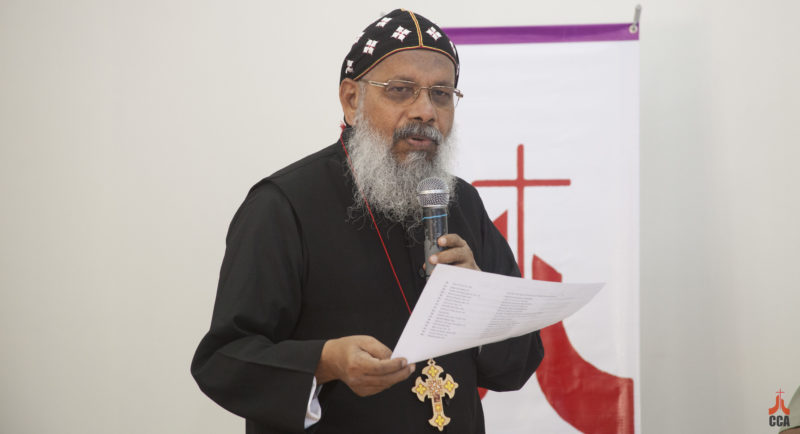Evangelization needs to be understood in the context of wider ecumenism, says Metropolitan Gabriel Mar Gregorios

CHIANG MAI, Thailand: “Evangelization should be accompanied by signs of the Kingdom, acts of love and compassion, miracles of faith, symbolic acts repudiating values of the world and evangelization need to be understood in the context of wider ecumenism”, said Metropolitan Dr. Gabriel Mar Gregorios, a prominent Orthodox theologian from India on the third day of the WCC-CCA consultation being held in Chiang Mai.
“The efficacy of the evangelical and missional enterprise needs to be measured in terms the quality of influence created by the gospel and not by the numerical increase in membership” elaborated Metropolitan Mar Gregoriose when defining the basis for understanding the quality of the propagation of the faith.
The emphasis on discipleship and the importance of nurturing good leadership in the ecclesiastical realm as well as the interrelatedness of discipleship, evangelism, and God’s mission were emphasized by the panelists of different sessions.
Grounding the backdrop of missional witness in India and Bangladesh, especially the growing restrictions placed on the propagation of religion, the promulgation of anti-conversion laws in several states of India, and the threats to freedom of religion, the participants began to look into the emerging situations in their local contexts.
They acknowledged the reality that the consequences of unethical practices of religious conversion and the proliferation of denominations funded by foreign missions add negative image and impact on Asian Christianity.
Describing the current reality of poverty, violation of human rights and gender justice and the urgency of addressing the ecological crisis in his native Timore Leste, a budding theologian from the Igreja Protestante Iha Timor Sa’e (IPTL), Levi Vasconceos Pinto said that “the history of evangelization and mission has been an integral part of the history of our struggles in Timor Leste; the gospel is not about a Church or religion, rather the essence of the gospel is a freedom movement and Jesus a freedom movement organizer devoted to the oppressed”.
“Our understanding of evangelization comes from diverse cultures of resistance in the Bible and other parts of the world and not necessarily from the four gospels alone. God’s mission must be understood comprehensively as a spirituality of living together to resist poverty and injustices” Pinto affirmed.
Listening to the parallels of challenges in multi-faith Asian contexts, especially when Christians were a minority, and the challenges to missional witness necessitating varied approaches to evangelism and mission, participants agreed that these should be addressed realistically in each context.
The scourge of denominationalism and how this has negatively impacted the life and witness of churches in Asia and the double-edged sword of foreign-funded missions that inhibits initiatives for indigenous self-sustenance were hotly debated.
The contextual presentations of missional challenges in Asia that livened the discussions on the third day were facilitated by Rev.Lalchhuangliana Tuallawt of Presbyterian Church of India (PCI), Rev Dr Simon Biswas of the Methodist Church in Bangladesh (MCB), Rev Bounthnh Chanthoumnivong of the Lao Evangelical Church (LEC), Rev. Dung Quoc Nguyen of the Justified Baptist Church in Vietnam (BCV), Mindo Judica Pangaribuan and Janty Lim of Gereja Bethel Indonesia (GBI), Rev Daniel Bani Winni Emma of Gereja Kristen Indonesia (GKI), and Rev Kang Phaldaracheat of Kampuchea Christian Council (KCC).
Groups of participants had earlier visited seven different churches for Sunday worship to understand the differing liturgical and worship traditions including the migrant workers and Diaspora community churches based in Chiang Mai.










